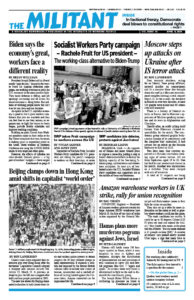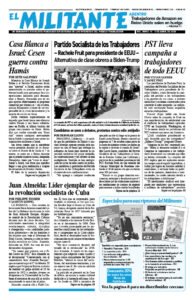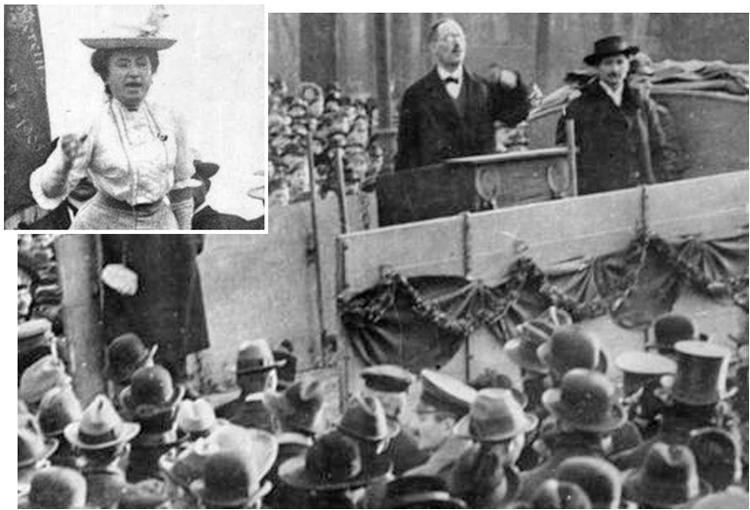Portraits, Political and Personal by Leon Trotsky is one of Pathfinder’s Books of the Month for April. Trotsky was a central leader of the October 1917 Russian Revolution led by V.I. Lenin and fought the overturn of its proletarian internationalist course by a bureaucratic counterrevolution headed by Joseph Stalin. The book includes 22 biographical sketches of political figures of that era. This excerpt is from “Karl Liebknecht and Rosa Luxemburg,” describing two key leaders of the left wing of the German Social Democratic Party who fought the party’s leaders and their betrayal of the working class by supporting the German rulers. They were inspired by the Bolshevik Revolution in Russia and fought to build a new party in Germany before they were murdered by the SPD government in 1919. Copyright © 1977 by Pathfinder Press. Reprinted by permission.
We have sustained, at one blow, two heavy casualties, and together they fuse into one great and terrible loss. Two of our leaders have been struck down from our ranks. Their names are entered forever in the great book of the proletarian revolution: Karl Liebknecht and Rosa Luxemburg. They have perished. They have been killed. They are no longer with us.
The name of Karl Liebknecht, famous even earlier, acquired immediate worldwide significance from the first months of the terrible European slaughter. It sounded like a name of revolutionary honor, like a promise of future victory. …
[H]and in hand with him from the first day of the war was the courageous, unhesitating, heroic Rosa Luxemburg. Arbitrary German bourgeois parliamentarism denied her the opportunity of sounding her protest from the parliamentary platform, as Liebknecht had done — thus less was heard from her. But her share in arousing the best elements of the German working class was no less than the share of her co-fighter in the struggle and in death, Karl Liebknecht. These two fighters, so different in nature and yet so alike, complemented each other, strove unyieldingly for the common goal, met death at the same time, and will go down together in history. …
Liebknecht was not a theoretician. He was a man of direct action. Impulsive and passionate by nature, he possessed exceptional political intuition, a sense of the masses and of circumstance, and finally, an incomparably courageous revolutionary initiative.
An analysis of the internal and international situation in which Germany found herself after November 9, 1918, and also a revolutionary prognosis, one could have, indeed should have, expected first of all from Rosa Luxemburg. A summons to direct action, and — at a certain moment — to armed uprising, would probably have come first from Liebknecht. These two fighters complemented each other in a way that could not be bettered.
Luxemburg and Liebknecht were scarcely out of prison when they took each other’s hand, that indefatigable revolutionary man and that unyielding revolutionary woman, and went together, at the head of the best elements of the German working class — to meet the new battles and trials of the proletarian revolution. And on the first steps of this path a treacherous blow has cut them down on one and the same day.
Indeed, reaction could have chosen no worthier victims. What a well-aimed blow! And no wonder: reaction and revolution knew each other well, for reaction this time was embodied in the persons of the former leaders of the former party of the working class, Scheidemann and Ebert, whose names will forever be inscribed in the black book of history as the shameful names of the organizers responsible for this treacherous murder. …
[Y]ou and I know only too well how these “spontaneous” onslaughts against revolutionary leaders are arranged by reaction; we well remember the July days, experienced by us here, within the walls of Petrograd; we remember only too well how the Black Hundreds, summoned by Kerensky and Tsereteli to fight against the Bolsheviks, systematically annihilated the workers and slaughtered their leaders, making short work of individual workers in the streets. The name of the worker Voinov, murdered by way of a “misunderstanding,” is remembered by most of us.
We managed to save Lenin then, but only because he did not fall into the hands of the enraged Black Hundreds. There were at that time among the Mensheviks and the SRs some pious people indignant because Lenin and Zinoviev, who had been accused of being German spies, were not going to appear in court to refute the slander. They were especially reproached for this. But what court was this? A court, on the road to which they would have arranged for Lenin to “flee,” as Liebknecht did? And if Lenin had been shot or stabbed, the official communication of Kerensky and Tsereteli would have said that the Bolshevik leader had been killed by the guard while trying to escape. No, now, after the terrible Berlin experience, we have tenfold grounds for being pleased that Lenin did not then appear in that kangaroo court, and, still more, that he did not risk punishment without trial.
But Rosa and Karl did not go into hiding. The enemy hand held them firm. And this hand strangled them! What a blow! What a misfortune! And what treachery! The best leaders of the German Communist Party are no more — our great comrades are no more among the living. And their murderers stand under the banner of the Social Democratic Party, and have the effrontery to trace their descent from none other than Karl Marx! What a perversion! What mockery! Just think of it, comrades: this “Marxist” Social Democracy, leader of the Second International, is the same party that betrayed the interests of the working class from the first days of the war, that supported unbridled German militarism during the rout of Belgium and the seizure of the northern provinces of France; the same party that betrayed the October revolution to German militarism after the Brest truce; the party whose leaders, Scheidemann and Ebert, are now organizing gangs of thugs to murder the heroes of the International, Karl Liebknecht and Rosa Luxemburg!


